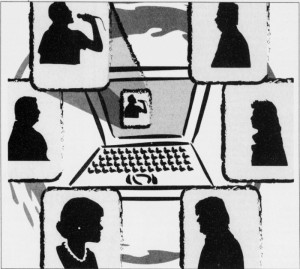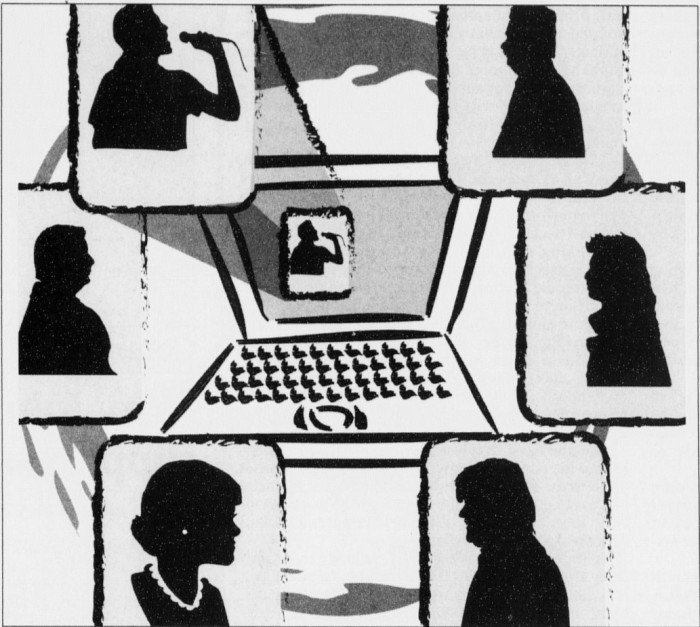This past week marked the passing of one of Silicon Valley’s influential leaders, SurveyMonkey CEO David Goldberg. The funeral was held at Stanford University, where many Silicon Valley leaders, including Facebook CEO Mark Zuckerberg, were in attendance. Silicon Valley wouldn’t be the tech tour de force it is now without the success of initiatives such as Facebook, and The Daily article below (initially published on Oct. 20, 2004) details how “thefacebook” began to take hold in college campuses.
Thefacebook vs. Campus Network
Is there room for more than one?
By SARAH LUSTBADER

Given the recent proliferation of online social networks like Friendster and the ever-expanding ranks of young people joining up, a safe assumption might be that these sites play an integral role in student life.
When asked, however, students who use these sites consistently list one arguably essential use for these networks: procrastination.
Senior Alicia Dantzker said that she used thefacebook — the network that is available at more than 175 colleges nationwide — “for procrastinating.”
“It’s a shockingly engaging waste of time.”
Nor do students at other schools necessarily find better uses for online social networks.
Oberlin senior Nick Arioli said, “I feel like I should have something profound to say, as I spend a lot of time studying social and political networks, but I think people just do it out of boredom.”
Given the innumerable procrastination tools available on the Internet — students can listen to music, read e-zines or shop — the fact that more than three-fourths of Stanford’s undergraduates have signed up with thefacebook shows that there might be more to online social networking than just putting off homework.
This week, a Web site similar to thefacebook. called Campus Network, became available at Stanford — raising questions about whether there is a market for several such online communities among college students.
Thefacebook, the leading online network at Stanford and among college students in general, began at Harvard University but now has about 500.000 users. The Web site’s creator, Mark Zuckerberg, set out to create an online database that would encourage social interaction at Harvard.
The network that emerged greatly resembles other online databases such as Friendster in that users create personal profiles, find friends at their school and at others and exchange messages.
“We started the site at Harvard, not really thinking that it would go much further than our school,” explained Harvard student Chris Hughes, who works as “The Press Guy” for thefacebook.
“After so many people signed up, we realized pretty fast that students at other schools might enjoy using the site …. We want every student who wants to be a member of thefacebook to be able to be a member of thefacebook. To that end, we’re trying to add as many colleges as quickly as possible to the network.”
Hughes reported no specific plans for the future of thefacebook apart from continuing the expansion to new campuses and adding new features, such as a partnership with a filesharing network.
Zuckerberg and co-founder Dustin Moskovitz have stopped out of Harvard for the semester to work on the Web site, and six people are currently on the payroll, which is generated by advertisements.
Hughes noted that the Web site itself is not making a profit, and denied that the team is motivated by its financial prospects.
“For now at least, we’re doing it because it’s fun,” Hughes said. “It’s nice to see something you’ve created be so popular — it gives us energy to keep revising and expanding the site.
Some Stanford students, however, suspect that money plays a bigger role.
“Maybe not now, but if it keeps spreading it might be the new Google, and those [Google] guys are billionaires,” said senior Nicole Marquez, whose comparison is striking given Zuckerberg and Moskovitz’s recent move to the Bay Area.
While some students regard thefacebook simply as a distraction from scholastic obligations, others find practical uses for it. This reporter, for one, has found thefacebook a far more useful tool for tracking down sources than Stanford’s online directory.
Some have more frivolous ends in mind. Many students said that they look for other attractive and single students on the network.
The creators of Campus Network launched their Web site at Columbia University during the summer of 2003, before thefacebook was created.
Columbia student Wayne Ting, one of the two designers of Campus Network, distinguishes it from thefacebook by emphasizing its substantive value.
“Facebook focuses on browsing and adding friends, but users who are looking for journal weblogs, to upload their pictures and rate their professors [will find that] those things aren’t available on facebook,” he said.
Columbia student Carrington Lee agreed that Campus Network offers a more diverse range of options than thefacebook.
“I use Campus Network like a blog, a photo album, instant messenger, and bulletin board,” she said. “I can post journals about the parties I went to over the weekend, the fact that I have a stereo for sale, or which songs are on repeat on my iTunes, and people are always ready to comment on whatever I happen to write.”
The question now is whether students at Stanford and elsewhere will express interest in another online social network. One indicator that there might be room for another network is the prevalence of both thefacebook and Campus Network at Columbia.
“A lot of people at Columbia use thefacebook as well,” said Columbia student Eva Colen. “Thefacebook. however, is completely different — there is no community whatsoever, it’s more like a classifieds section.
“You can build relationships and express your personality on Campus Network, whereas thefacebook only allows you add friends and stalk crushes.”
Stanford students are generally more skeptical of Campus Network’s potential elsewhere.
“It’s kind of lost its novelty, and I’m not sure if people will feel like signing up for yet another network,” Dantzker said. “CampusNetwork actually sounds like a much better idea. Too bad it didn’t start here first.”
Like thefacebook’s creators, Ting claims that the prospect of financial success has not been the principal motivating factor, but he does not rule out the possibility in the future.
“We have a few volunteers and none of us are getting paid,” he said. “We’re doing this for the same reason that we started it initially. It’s an extracurricular hobby.
“If it’s a way to make money in the future, fine. But we’re not making money right now.”
